
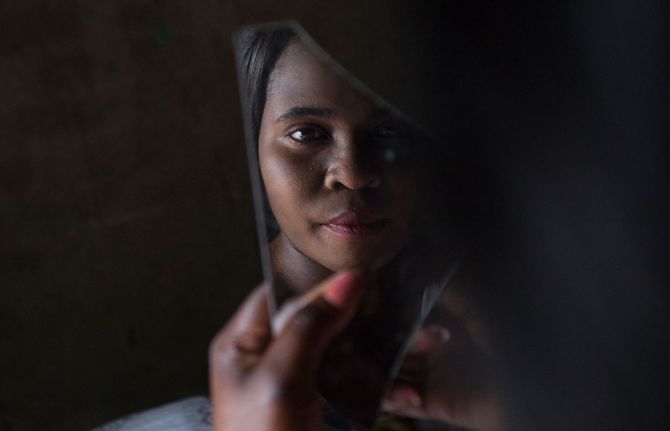
Feature Story
COVID-19 responses must uphold and protect the human rights of sex workers
24 April 2020
24 April 2020 24 April 2020The Global Network of Sex Work Projects (NSWP) and UNAIDS recently released a joint statement calling on countries to take immediate, critical action to protect the health and rights of sex workers during the COVID-19 pandemic.
The pandemic, as with other health crises, is exposing existing inequalities and disproportionately affecting people already criminalized, marginalized and living in precarious health and economic situations, often outside social protection mechanisms.
Around the world, sex workers are being forgotten in government responses to the COVID-19 crisis. As sex workers and their clients self-isolate, sex workers are finding themselves unprotected, increasingly vulnerable and unable to provide for themselves and their families. In Ecuador, the Colectivo Flor De Azalea (the Association of Women Sex Workers) has highlighted the sudden lack of support and access to basic services that sex workers face. “Women sex workers have suffered a great impact due to the health emergency. We take to the streets with great fear and we are afraid of being violated. We do not have money for food, rent, medicine; health services are closed. There is no access to condoms—colleagues have died due to COVID-19.”
“Human rights law mandates that human rights are inalienable, universal, interdependent and indivisible,” said Winnie Byanyima, Executive Director of UNAIDS. “Ensuring that this is a reality for all—especially the most vulnerable among us—is essential during this pandemic, but will also build the resilient communities we need to emerge from it.”
As sex workers report interruptions to condom supplies owing to the pandemic, sex workers living with HIV say they are losing access to essential medicines as well. In Eswatini, Voice of Our Voices report that, “for those who are on HIV treatment, it is hard to meet their visit days as there is no transport. For prevention commodities, it is hard to reach them.”
With sex work criminalized in almost every country, sex workers are also more vulnerable to punitive measures linked to the enforcement of COVID-19 regulations. Increased policing can expose sex workers to more harassment and violence, and in several countries has already led to home raids, compulsory COVID-19 testing and the arrest and threatened deportation of migrant sex workers. For those who are driven to the streets by homelessness, as has become the case for many brothel and migrant sex workers, the lack of support means little safety or means to follow through on government requirements.
The criminalization of sex work in most countries also poses particular challenges for accessing government support. In the United States of America, SWOP-Tucson (the Sex Workers Outreach Project) explained that, “many of these schemes require proof that employment has been lost or reduced as a result of COVID-19. Because sex work is criminalized, it’s not possible to provide necessary paperwork and proof of unemployment or hardship. Thus, sex workers can’t get rent/mortgage relief, utility payment abatements or unemployment checks.”
Even in countries where sex work is legalized to some degree, many sex workers are finding that the system of benefits extended to workers in the formal sector does not include them. This is the case in Germany, for example, where sex workers highlight the barriers to accessing support for anyone living outside of the system. “While the government has provided a package for (registered) freelance workers, sex workers have not been in any way addressed in particular, and there is no potential for anyone living here illegally to access money from them.”
As the global crisis deepens, sex workers are increasingly faced with the difficult choice of isolation with no income or support or working at a risk to their own health and safety. Another problem has been that the majority of affordable short-term housing opportunities have closed while sex workers struggle to pay rent or pay hotel room fees. This disappearance of short-term housing, coupled with the shuttering of workplaces, has resulted in sudden homelessness for sex workers in several countries, a situation that is especially aggravated for migrant sex workers, many of whom are also finding themselves stranded by border closures.
Despite the continued exclusion of sex worker communities from emergency public health planning groups, sex workers have begun coordinating their own responses to the crisis. Several mutual aid and emergency fundraising campaigns have been created, enabling sex workers and sex worker organizations to access and distribute funds and essential items. One such initiative was undertaken by And Soppeku, a sex worker-led organization in Senegal, which distributed food packages and hygiene kits to members in three regions (Dakar, Thies and Kaolack). Similar initiatives are being developed around the world in the absence of government action and support.
However, the self-organization of individuals and groups must not be considered a substitute for urgently needed government support. Governments are bound by international human rights law to respect, protect and fulfil human rights, without discrimination, even in times of emergency.
Sex workers and sex worker organizations are calling for equal protection under the law and access to income support and to health care. UNAIDS joins this call to action, underscoring the importance of a human rights-based approach to COVID-19 responses, centred on empowerment and community engagement.
Quotes in this article were gathered through NSWP’s COVID-19 Impact Survey, which is collecting responses from sex workers and sex worker organizations in order to monitor what governments are doing for the sex worker community at this time.
Resources
Related

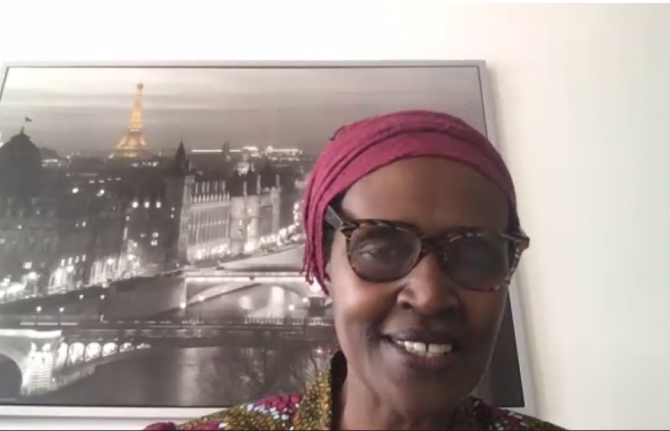
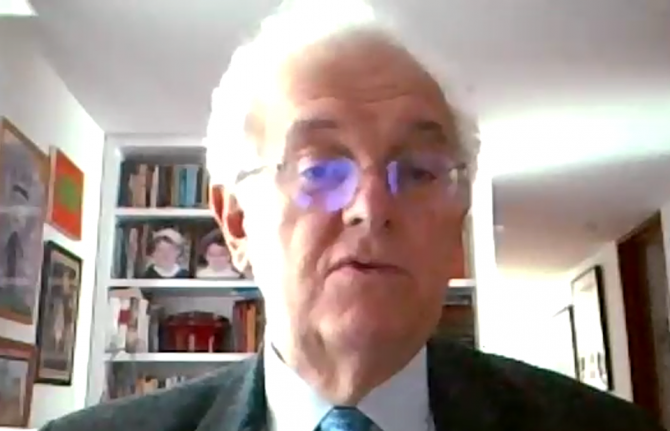

Press Statement
UNAIDS calls for increase in health spending and social protection as an essential part of the economic response to COVID-19
17 April 2020 17 April 2020UNAIDS Executive Director Winnie Byanyima’s statement on the economic response to COVID-19 during an online event held on 16 April 2020 cosponsored by the Global Development Policy Center and the United Nations Conference on Trade and Development
COVID-19 is killing people. However, the scale and the consequences of the pandemic are man-made.
It was not inevitable that there would be thousands of lives lost and millions of livelihoods destroyed. Those losses are the result of the extreme inequality that is hardwired into our global economy.
The steepness of the mortality curves, the depth of the economic losses and the social upheavals in different countries are the consequences of our policy choices, a function of the economic model that we have created.
COVID-19 has pushed the world into a recession. The International Monetary Fund is reporting that the great lockdown is going to be worse than the global financial crisis of 2008. According to the International Labour Organization, COVID-19 is expected to wipe out the equivalent of 195 million full-time jobs.
As we know from the HIV epidemic, epidemics wreak havoc in an unequal world. They feed off existing inequalities and hit the most vulnerable and marginalized the hardest—those who have no access to health care, who have no social safety net, who have no right to sick leave or who have no water with which to wash their hands. The people whose right to health is denied are those who are hit first and hit the hardest.
When governments prioritize privatized health-care systems over publicly funded universal health care they are making a choice, they are saying that the right to health becomes a privilege for the few who can afford it. When an epidemic hits, that choice translates into a decision about who will live and who will die. Those with the privilege of access to health care live, those without, die.
Governments must invest in universal social protection. In poor communities around the world, we are hearing: “If we cannot work, we will die of hunger before we get sick from the coronavirus.” This is a choice no one should have to make. This health crisis is rapidly becoming a food crisis.
Across our economy, we see business models that rely on workforces that are not protected. Models that exploit workers and suppliers, that do not support or protect them.
The climate crisis is another consequence of our rigged economic model, exploitative of the ecosystems on which we depend. And again, it is the poorest, those least responsible for the exploitation, who are the hardest hit. Right now in the Pacific, people are not only struggling against COVID-19 but are recovering from the aftermath of Cyclone Harold.
None of this is an accident. It is by design. Earlier, I said that we are living with man-made choices, and in many ways they are MAN-made. It is men who still dominate corporate boardrooms and the corridors of political power, while it is women who take the biggest burden of caring for others—women who must look after sick relatives in a pandemic or who walk further to find drinking water.
But the story is not all bleak. We are seeing some silver linings; some lessons are being learned. We are seeing more awareness of the importance of health and social protection. This means that if we are to recover, we must reset—we can’t go back to where we were.
We are seeing some countries imposing what they are calling solidarity taxes on big businesses and on wealthy individuals. We are hearing about cancellation of student debt, health fees being waived, including user fees, and more support for carers. This is a new agenda.
However, we are seeing other countries moving in a different direction—tax cuts for the rich, bailouts for big companies, without any guarantee that those bailouts are going to translate into support for the workers and suppliers on the ground. So, we are seeing different signals.
Health spending and social protection must be increased. This could be the basis for the rebuilding, not so that it’s not just a patch-up with bailouts.
We must come out of this crisis differently, with a determination to change the economic model. We need a Global Green New Deal, where the stimulus is invested in people and in the planet.
A new economic model that expands universal health coverage and universal social protection to all, that boosts decent work and pays decent wages, where the rewards are distributed across the whole supply chain and every stakeholder benefits equitably. And a model in line with the Paris Agreement on climate change.
We have a chance to make different choices and I am praying that world leaders will decide to make different choices.
UNAIDS
The Joint United Nations Programme on HIV/AIDS (UNAIDS) leads and inspires the world to achieve its shared vision of zero new HIV infections, zero discrimination and zero AIDS-related deaths. UNAIDS unites the efforts of 11 UN organizations—UNHCR, UNICEF, WFP, UNDP, UNFPA, UNODC, UN Women, ILO, UNESCO, WHO and the World Bank—and works closely with global and national partners towards ending the AIDS epidemic by 2030 as part of the Sustainable Development Goals. Learn more at unaids.org and connect with us on Facebook, Twitter, Instagram and YouTube.

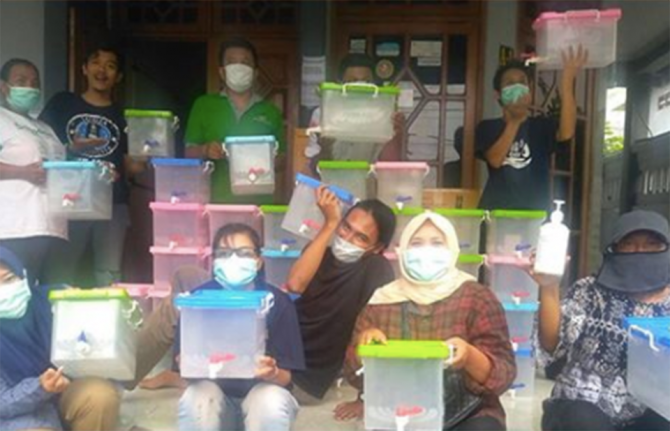
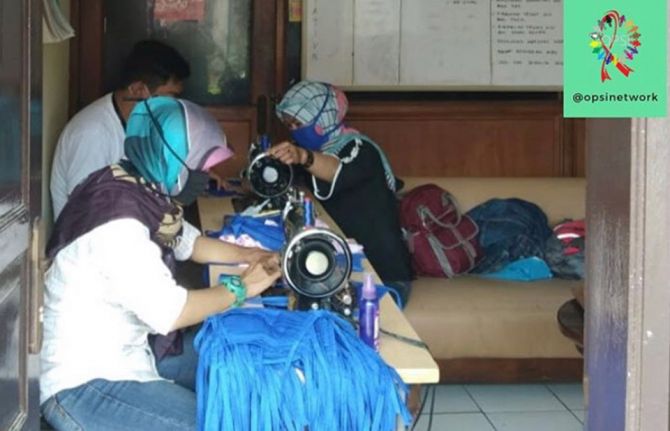
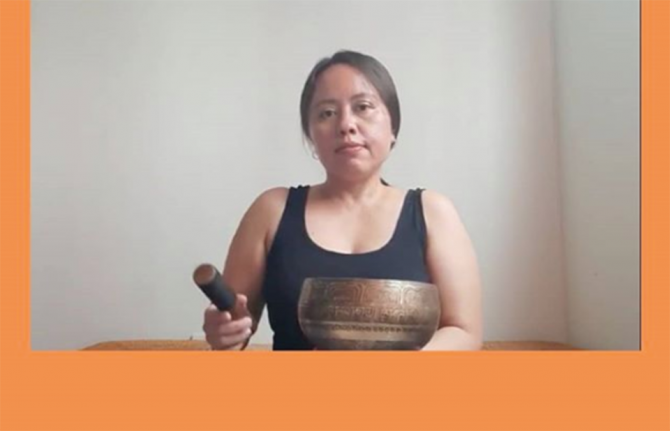
Feature Story
Sex workers adapting to COVID-19
21 April 2020
21 April 2020 21 April 2020Although difficult for everyone, the COVID-19 pandemic has had severe impacts on key populations, many of whom are experiencing economic hardship and anxiety about their health and safety.
Rito Hermawan (also known as Wawan), the Advocacy Coordinator of the Network of Sex Workers of Indonesia (OPSI), explained that the places that sex workers work in Indonesia have been closed down. Since, for their own safety, sex workers are avoiding working on the streets, many have been left without an income, unable to make ends meet.
It’s been about a month since Indonesia enacted a set of preventive measures against COVID-19. With the uncertainty of when life may return to normal, OPSI is supporting the urgent needs of the sex worker community.
Many sex workers are increasingly needing mental health support to combat the stress and anxiety they are currently experiencing. In a rapid survey conducted by the Indonesian Positive Network to review the needs of people living with HIV and key populations, more than 800 out of 1000 people surveyed expressed a need to access mental health and psychosocial support.
In order to address this, OPSI uses social media to provide virtual mental health support. “Through our social media, we are able to reach sex workers and empower them with information, motivation and support. They need to know that they are not alone, even though we may not be physically close,” said Mr Wawan.
A video teaching meditation and breathing techniques was recently launched to help sex workers cope with stress and to improve their general well-being. OPSI is also highlighting innovative work, such as making masks for sex workers during the COVID-19 pandemic. For those who need one-on-one support, OPSI has also established a counselling hotline.
In addition to supporting the sex worker community in Indonesia, OPSI is also exploring ways for outreach efforts to be continued despite the current conditions. The essential work of outreach workers should not come to an abrupt halt because of COVID-19, but it will need to move to a virtual form.
With technical assistance from the United Nations Population Fund Indonesia, OPSI developed a module on virtual outreach. The module outlines how outreach workers can adapt their work online, such as by using WhatsApp. The outreach workers are provided with lists of HIV counselling and testing services that are still open in 88 districts in Indonesia, which they can use to refer sex workers.
Sex workers, like others, are facing incredible hardships during the COVID-19 pandemic, whether it be struggles with their mental health, difficulty in continuing their work and loss of income. The role of networks and organizations of sex workers like OPSI is incredibly important in ensuring that the needs of sex workers are supported at this vital time.
Resources
Region/country

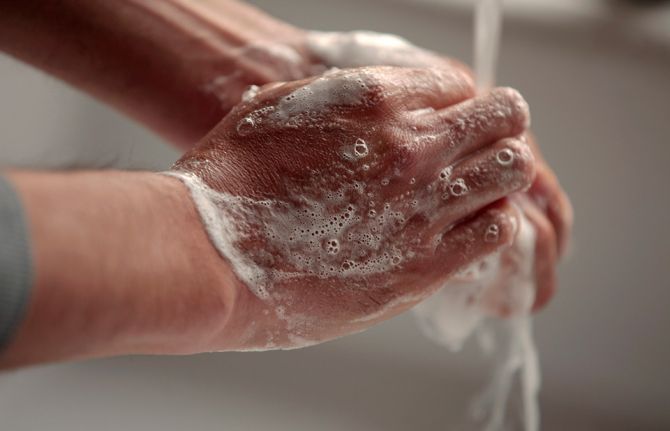
Feature Story
UNAIDS and Reckitt Benckiser join forces to distribute hygiene packs to people living with HIV during the COVID-19 outbreak
17 April 2020
17 April 2020 17 April 2020UNAIDS Regional Support Team for Eastern and Southern Africa (RST ESA) and Reckitt Benckiser (RB) have today joined forces to distribute more than 195 000 “hygiene packs” to people living with HIV in the eastern and southern African (ESA) region. Twenty-five thousand additional packs will be supplied to Nigeria and Egypt.
The packs consist of a three-month supply of Dettol soap and Jik surface cleaner and will be distributed in 19 ESA countries through UNAIDS Country Offices and networks of people living with HIV as part of efforts to reduce exposure to the impact of COVID-19 among people living with HIV.
The ESA region has the biggest burden of HIV globally, with 20.6 million people living with HIV in 2018. While countries in the ESA region are currently relatively unaffected by COVID-19, it is critical to take bold and unprecedented steps to curtail the spread of the virus now, due to fragile health systems and extreme socio-economic inequalities.
“UNAIDS will be working closely with communities and networks of people living with HIV at a country level in the coming weeks to facilitate distribution of the hygiene packs. As we continue to respond to the COVID-19 pandemic in this region, it is important that communities lead and that we put people at the centre,” said Aeneas Chuma, Director of the UNAIDS RST ESA, a.i.
The initiative to distribute the hygiene packs is part of RB’s “Fight for Access Fund”, which aims to improve access to health, hygiene and nutrition for all.
“We are delighted to partner with UNAIDS, in our collective response to the global COVID-19 pandemic,” said Russell Taylor, RB’s Regional Director Africa, Health. “Our immediate focus is to address the stress faced by our consumers and communities where we operate, to break the chain of infection. The distribution of the hygiene packs to people living with HIV in a region which is heavily affected by the AIDS epidemic is a critical part of our response.”
Although there is currently no clear evidence that people living with HIV are at an increased risk of acquiring COVID-19 or of becoming more ill from it, many people living with HIV are ageing and/or have other health conditions. These include Tuberculosis, heart disease or lung disease, which are known to make people susceptible to more severe COVID-19 disease.
In addition, there are 6.8 million people living with HIV in the ESA region who do not have access to antiretroviral therapy which may compromise their immune systems.
Thus, UNAIDS encourages people living with HIV to take precautions to reduce exposure to COVID-19 and to reach out to their health-care providers to ensure they have adequate stocks of essential medicines. This includes following World Health Organization (WHO) guidelines of washing and/or sanitizing hands, practicing social distancing, and seeking health care if one is ill.
Resources
Region/country


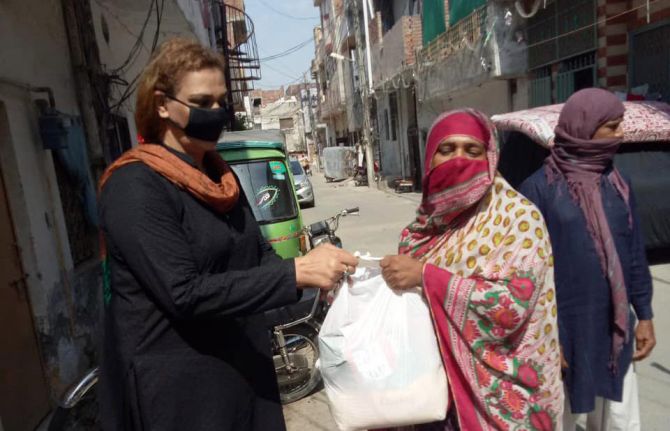
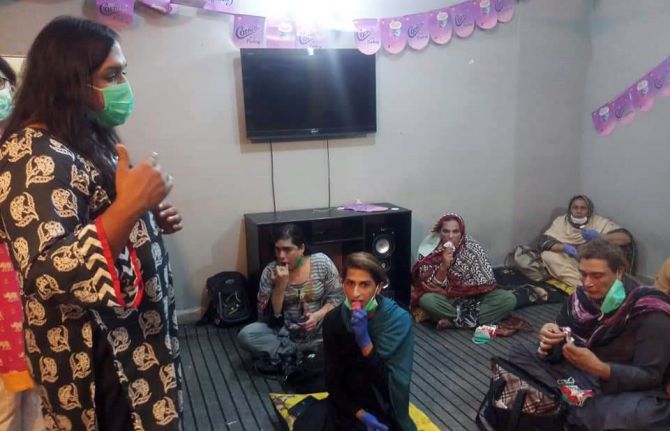
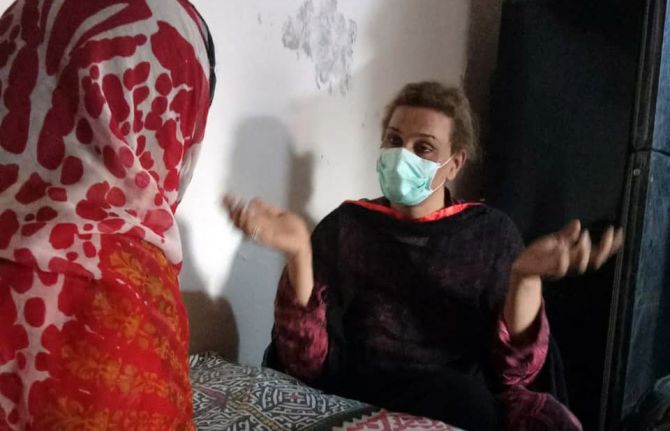
Feature Story
Keeping HIV treatment available in Pakistan during COVID-19
15 April 2020
15 April 2020 15 April 2020Sitting near her broken window, Ashee Malik (not her real name), a transgender woman who lives in Punjab Province, Pakistan, is counting her earnings, realizing that her income has fallen sharply. Her only source of money is dancing, begging and entertaining her clients, but since the lockdown imposed on 20 March to stop COVID-19, she hasn’t been able to leave her home. Her bright clothes are in her wardrobe, as is her makeup kit, laying unused for weeks. “We are concerned about our well-being, as we do not have enough resources to support ourselves and our families,” she said.
Ms Malik’s story is similar to that of most transgender people living in Pakistan, who face stigma, discrimination and social isolation. Access to health services, education and employment is one of the many challenges that transgender people face in the country, despite the passing of the Transgender Persons Protection of Rights Act 2018. And COVID-19 and the associated lockdown are making matters worse. As of 15 April, there were more than 5900 confirmed cases of COVID-19 in Pakistan and 107 deaths.
Owing to the restrictions on the movement of people, there is a real risk of a disruption to critical services for people living with HIV, which disproportionality affects transgender people in Pakistan.
The Khawaja Sira Society (KSS), which works with transgender people, has stepped in to provide support, working with the most marginalized and promoting knowledge about how to prevent HIV and COVID-19.
“The transgender community is even more vulnerable due to the prejudice and stigma and discrimination against them. We need to develop a COVID-19 prevention model by keeping in mind the dynamics and issues of the community in this pandemic,” said Mahnoor Aka Moon Ali, the Director of Programmes for KSS.
During discussions that KSS had with 150 transgender people, of whom approximately 30% are living with HIV, several issues were repeatedly raised, including the lack of income and the small size of Dheras, community homes for transgender people, in which four or five transgender people live together, making social distancing difficult. Since most of the transgender people contacted are illiterate, public health campaigns on how to prevent infection by the coronavirus are not getting through. Fear of the disease is high, which is impacting on mental health. The Government of Pakistan has announced that food aid will be made available, but transgender people face challenges in accessing the scheme, which is dependent on verification based on the national identification card, something that most transgender people in the country simply don’t have.
Social media is increasingly being used during the lockdown and together with UNAIDS Pakistan, KSS is disseminating information on hygiene, preventive measures and social distancing on social media and is engaging with the community on COVID-19. KSS, together with provincial government authorities, is also working to ensure that people living with HIV can get multimonth refills of antiretroviral therapy delivered to their home.
“We as transgender people living with HIV feel we are at risk by visiting government-run antiretroviral therapy centres. We need antiretroviral therapy to be delivered to us,” said Guddi Khan, a transgender woman who is living with HIV.
Since an uninterrupted supply of antiretroviral therapy is essential for people living with HIV, the Pakistan Common Management Unit for AIDS, TB and Malaria, in collaboration with UNAIDS and other partners, has established virtual platforms and helplines in order to ensure that coordination is continued. An emergency stock of antiretroviral therapy has been made available for people living with HIV for the next two months and a buffer stock is being made available through the Global Fund to Fight AIDS, Tuberculosis and Malaria in order to avoid interruptions in the event that imports of medicines are disrupted.
“We are working closely with the Association of People Living with HIV, federal and provincial governments and the UNAIDS family to monitor the situation and quickly help address barriers in accessing life-saving HIV services in these extremely challenging times of the COVID-19 crisis,” said Maria Elena Borromeo, the UNAIDS Country Director for Pakistan and Afghanistan.
Resources
Region/country

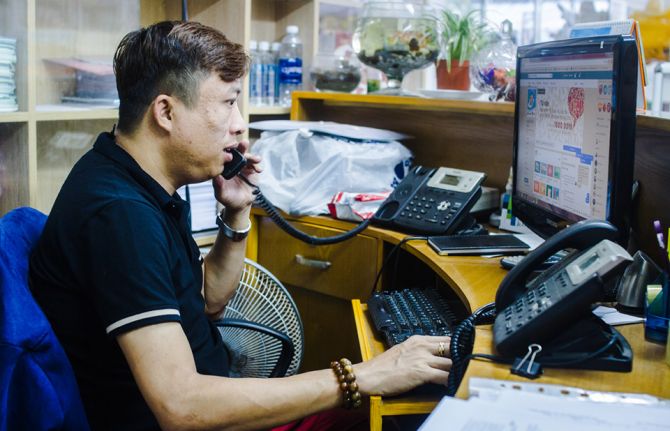
Feature Story
Community networks extend arms to connect people to medicine in Viet Nam
17 April 2020
17 April 2020 17 April 2020When the Vietnamese Government introduced social distancing mid-March 2020 to respond to COVID-19, Binh Nam (not his real name), already on distance learning from his college since February, lost his part-time job at a small company. He decided to leave Ho Chi Minh City, which had a cluster of confirmed COVID-19 cases, to settle back in his home town, about 300 kilometres away.
“Going home seemed like the best option for me at the time,” Mr Nam said.
He arrived at his parents’ home just before buses shuttling people back and forth across the provinces stopped. With stricter lockdown measures taking effect in early April, he realized he was in a bind. He would run out of HIV treatment.
“I considered going to a local HIV clinic, but feared my HIV status would be disclosed,” he said. “I also could not buy antiretroviral medicine at private clinics because that would clear out my savings.”
And he definitely did not want to ask his parents, because they didn’t know he was living with HIV.
“I felt desperate,” he said. As a last resort, Mr Nam texted a man who runs a social media channel on HIV information, education and counselling that he follows.
Upon learning of Mr Nam’s situation, Nguyen Anh Phong, a representative of the Viet Nam Network of People Living with HIV (VNP+) in the south of Viet Nam and co-founder of the Lending a Helping Hand Fund, mobilized some funds to get him an antiretroviral therapy refill.
“This was among the first calls for help that made us notice more and more people were stuck in their home province with a limited amount of antiretroviral medicine,” Mr Phong said.
He and his VNP+ peers decided to form a group on one of the most popular social media chatting platforms in Viet Nam to find ways to connect people and help them collect medicine at clinics other than their own. More than 150 community members joined the group across the country.
Community feedback filtered back to the Viet Nam Authority for HIV/AIDS Control (VAAC) at the right time as it was drawing up emergency contingency plans. It was dealing with a hospital closed because of a temporary COVID-19 quarantine in Hanoi, so people couldn’t access HIV services or treatment. And with so many people stranded in the provinces, something had to be done.
VAAC issued new guidelines on HIV care and treatment during the pandemic developed with technical support from the United States President’s Emergency Plan for AIDS Relief, the Global Fund to Fight AIDS, Tuberculosis and Malaria and the United Nations.
“We invited the Viet Nam Network of People Living with HIV to join our technical discussions and to give us feedback because they know the challenges faced by people living with HIV,” said Phan Thi Thu Huong, VAAC Deputy Director in charge of HIV care and treatment.
The guidelines allow for multimonth antiretroviral therapy refills for all people on HIV treatment and for the provision of pre-exposure prophylaxis and tuberculosis medicines.
Provinces have been assigned focal points and hotline numbers for people who experience unusual symptoms.
More importantly, the standard referral requirements were eased in order to allow clients temporary access to alternative HIV clinics for antiretroviral therapy refills. VAAC also proactively resolved procurement challenges in order to avoid stock-outs, so Mr Nam and others could access HIV clinics of their choice for refills.
Viet Nam’s HIV epidemic is concentrated mostly among gay men and other men who have sex with men, transgender women, people who inject drugs and female sex workers and their intimate partners, with a rising HIV prevalence among gay men and other men who have sex with men .
“I believe that by joining hands, we can help all people get their refills so that no one misses their treatment because of COVID-19,” said Mr Phong.
Working hand in hand and getting results is what communities do best, according to Marie-Odile Emond, the UNAIDS Country Director for Viet Nam. “These networks are pillars of peer support and resilience and now more than ever they’re like an extended arm of the public health sector,” she said.
Resources
Region/country

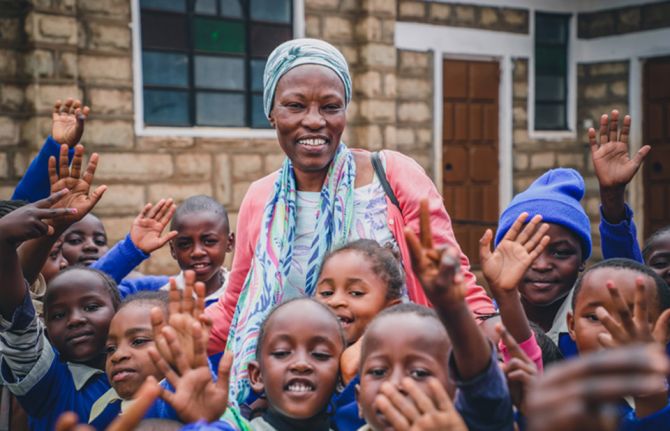
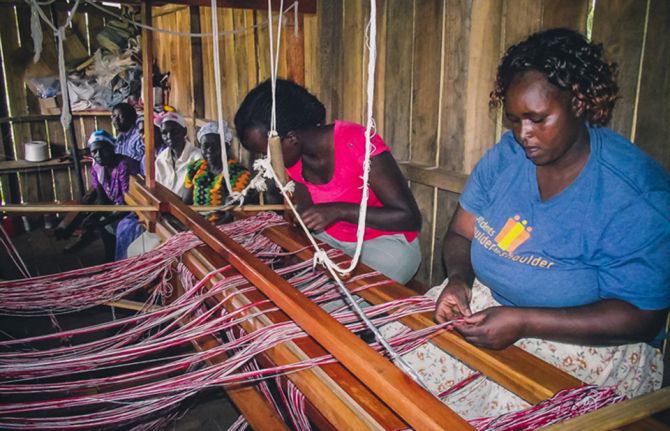

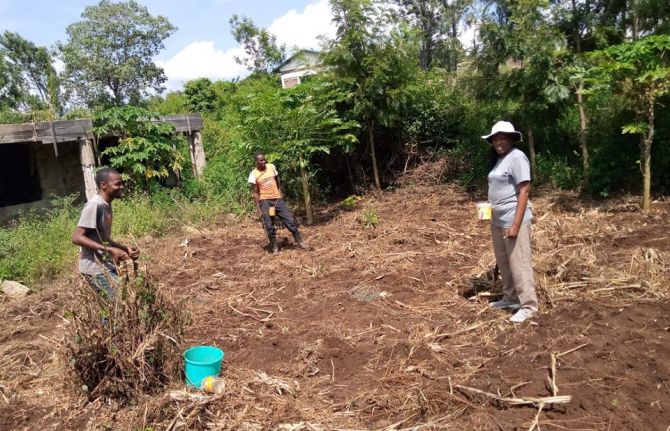
Feature Story
Building peace through sustainable initiatives
16 April 2020
16 April 2020 16 April 2020“Peace is not merely the absence of war—it is when people have access to resources that enable them to meet their basic needs so they can live their life with dignity. If people have no nutritious food, if children do not go to school, if there is a conflict, then they are not at peace. COVID-19 came to remind us about it,” said Karambu Ringera, the founder and President of the International Peace Initiatives in Kenya.
Ms Ringera says that peace is holistic—even though her organization focuses on women living with HIV and AIDS-related orphans, she believes that it is also working for peace.
Her work started back in the early 2000s, when Ms Ringera was a student in the United States of America. When she returned to her home town in Kenya, Meru, for the summer holidays, she met a group of women, some of whom had recently lost their husbands. Most of the women didn’t know the cause of death of their husbands, but since AIDS-related deaths in Kenya were at their peak then, Ms Ringera suspected the reason. She encouraged the women to find out their own HIV status so as to not follow in their husbands’ footsteps.
Moved by the plight of many of the women she met, many of whom couldn’t afford to send their children to school or access HIV treatment, when back in the United States Ms Ringera arranged a cultural event, at which Kenyan food was served and people could learn about African culture. She collected US$ 400—enough to send seven children to school.
“I love the proverb about not just giving a person a fish, but teaching them how to fish,” she said. She wanted to help more children at home in Kenya, but, said Ms Ringera, “I wanted to go beyond just being someone who came to study poor women, create a solution for them and ask them to implement it.” For her, it was important for the women to understand that they could help themselves.
The women decided that they would make jewellery, which could be sold at her cultural fundraising events. At the same time, women started developing more skills, such as weaving and catering, so they could start their own businesses and support themselves.
Nearly two decades later, Ms Ringera runs a nongovernment organization that provides sustainable initiatives for orphans, women living with HIV, survivors of violence and communities with the tools and resources they need to move on from violence, poverty and crisis to stability and self-reliance.
In the beginning, many of the women who work at the International Peace Initiatives couldn’t afford a US$ 3 school uniform for their children. Today, Ms Ringera is proud that many have put their children through university. “People even in vulnerable circumstances can transform their lives. We have women and children, young people, to show that this is possible. We need to create interventions that inspire people to save themselves,” she said.
In the time of COVID-19, though, Ms Ringera is worried.
“We will need a good strategy to survive as a family,” she said. “Since 2009, when our children’s home was opened, this is the first time that we closed its doors to visitors. We did this immediately after hearing the news about the new coronavirus.”
The children’s home is home to 76 children, who need to be fed three times a day. Ms Ringera thinks that sustainability is key—Ms Ringera and her team are planting crops, keeping chickens and trying to collect a store of food for at least three months. “I feel that more and more, people need to create their own sustainable systems where they are, so that during challenges like this, at least they can have their own food locally,” she said.
Resources
Region/country
Related

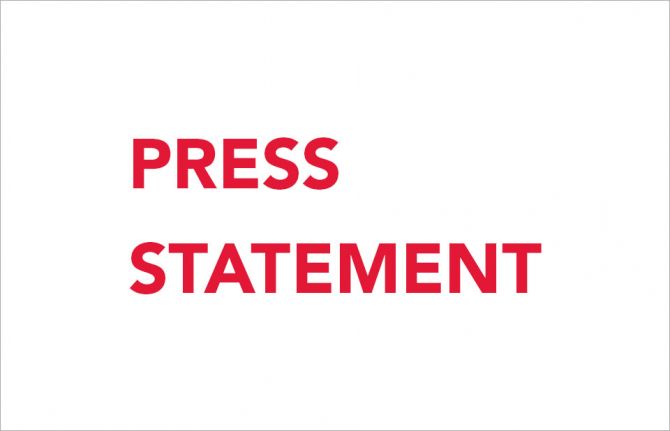
Press Statement
UNAIDS condemns misuse and abuse of emergency powers to target marginalized and vulnerable populations
09 April 2020 09 April 2020GENEVA, 9 April 2020—UNAIDS is deeply concerned by reports that the COVID-19 epidemic is being used as an excuse to target marginalized and vulnerable populations, restrict civil society space and increase police powers. In particular, UNAIDS is extremely concerned by reports of new laws that restrict rights and freedoms and target criminalized groups in a manner that will harm the rights and health of people living with or vulnerable to HIV.
“In times of crisis, emergency powers and agility are crucial; however, they cannot come at the cost of the rights of the most vulnerable,” said Winnie Byanyima, Executive Director of UNAIDS. “Checks and balances that are the cornerstone of the rule of law must be exercised in order to prevent misuse of such powers. If not, we may see a reversal of much of the progress made in human rights, the right to health and the AIDS response.”
Experience from past and present epidemics shows clearly that an effective response to health crises such as COVID-19 must be deeply rooted in trust, human solidarity and unwavering respect for human rights. However, reports have recently emerged that some countries are using emergency powers or public health justifications to restrict rights related to personal autonomy, gender identity, freedom of speech and sexual and reproductive health and rights. There have also been concerning reports of increases in criminal penalties in relation to HIV transmission, exposure and non-disclosure and the use of police powers to target, through arrests and brutality, vulnerable and criminalized groups, such as sex workers, people who use drugs, people living with HIV and lesbian, gay, bisexual, transgender and intersex (LGBTI) people.
In Hungary, a new bill has been introduced to remove the right of people to change their gender and name on official documents in order to ensure conformity with their gender identity, in clear breach of international human rights to legal recognition of gender identity.
In Poland, a fast-tracked amendment to the criminal law that increases the penalties for HIV exposure, non-disclosure and transmission to at least six months in prison and up to eight years in prison has been passed—a clear contravention of international human rights obligations to remove HIV-specific criminal laws.
UNAIDS is concerned by reports of countries resorting to the use of criminal law, such as the criminalization of the transmission of COVID-19, and arresting and detaining people for breaching restrictions. Our experience in the HIV epidemic is that criminalization of virus transmission leads to significant human rights violations, undermines the response and is not based on science. The ability to prove actual transmission from one person to another, as well as necessary intent, is almost impossible and fails to meet rule of law requirements for criminalization. Criminalization is often implemented against vulnerable and stigmatized communities. In Uganda, 23 people connected with a shelter for providing services for the LGBTI community have been arrested—19 have been charged with a negligent act likely to spread infection or disease. Those 19 are being held in prison without access to a court, legal representation or medication.
UNAIDS is also concerned by reports from a number of countries of police brutality in enforcing measures, using physical violence and harassment and targeting marginalized groups, including sex workers, people who use drugs and people who are homeless. The use of criminal law and violence to enforce movement restrictions is disproportionate and not evidence-informed. Such tactics have been known to be implemented in a discriminatory manner and have a disproportionate effect on the most vulnerable: people who for whatever reason cannot stay at home, do not have a home or need to work for reasons of survival.
In Kenya, civil society organizations, prompted by concerns about actions being not consistent with a human-rights based epidemic response, released an advisory opinion calling for a human rights-based approach to be adopted in the COVID-19 response and have released a letter calling for a focus on community engagement and what works for prevention and treatment rather than disproportionate and coercive approaches.
While some rights may be limited during an emergency in order to protect public health and safety, such restrictions must be for a legitimate aim—in this case, to contain the COVID-19 pandemic. They must be proportionate to that aim, necessary, non-arbitrary, evidence-informed and lawful. Each order/law or action by law enforcement must also be reviewable by a court of law. Law enforcement powers must likewise be narrowly defined, proportionate and necessary.
UNAIDS urges all countries to ensure that any emergency laws and powers are limited to a reasonable period of time and renewable only through appropriate parliamentary and participatory processes. Strict limits on the use of police powers must be provided, along with independent oversight of police action and remedies through an accountability mechanism. Restrictions on rights relating to non-discrimination on the basis of HIV status, sexual and reproductive health, freedom of speech and gender identity detailed above do not assist with the COVID-19 response and are therefore not for a legitimate purpose. UNAIDS calls on countries to repeal any laws put in place that cannot be said to be for the legitimate aim of responding to or controlling the COVID-19 pandemic.
UNAIDS
The Joint United Nations Programme on HIV/AIDS (UNAIDS) leads and inspires the world to achieve its shared vision of zero new HIV infections, zero discrimination and zero AIDS-related deaths. UNAIDS unites the efforts of 11 UN organizations—UNHCR, UNICEF, WFP, UNDP, UNFPA, UNODC, UN Women, ILO, UNESCO, WHO and the World Bank—and works closely with global and national partners towards ending the AIDS epidemic by 2030 as part of the Sustainable Development Goals. Learn more at unaids.org and connect with us on Facebook, Twitter, Instagram and YouTube.

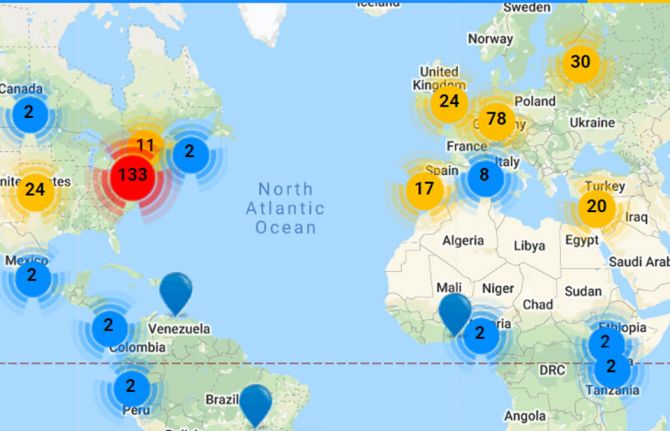
Feature Story
New innovations map to strengthen the response to COVID-19
08 April 2020
08 April 2020 08 April 2020A Coronavirus Innovation Map has been launched by StartupBlink together with the Health Innovation Exchange—a UNAIDS initiative to leverage the potential of innovations to improve the health of all—and the Moscow Agency of Innovations.
The map is a directory of hundreds of innovations and solutions globally that could support and strengthen the response to COVID-19, helping people to adapt to life during the COVID-19 pandemic and to connect innovators so they can collaborate on solutions.
The map provides information on five categories: prevention, diagnosis, treatment, information and life and business adaptation. As part of the prevention category, for example, the directory highlights the Track Virus app, which shows where the virus has spread in Israel, and a test kit to detect COVID-19 developed by E25Bio that will be able to deliver results in half an hour.
The directory also shows ways in which people can get medicines without leaving their home—telehealth and home medicine delivery solutions will be just as relevant for COVID-19 as for the AIDS response.
The information category shows how people can get timely and accurate information about the crisis and innovations, while the life and business adaptation category shows how people can adapt by doing things virtually—in only a short amount of time, schools and universities have switched to e-learning and home offices have replaced onsite offices.
The map is designed to provide information to government officials, venture capitalists, entrepreneurs and others to support the response to COVID-19 and address the pandemic and its impact.
“We are facing a challenge like never before and we need to work together to bring the best of ideas to beat the virus. The Coronavirus Innovation Map aims to provide a platform for innovators, every one of us, to collaborate and engage with the response,” said UNAIDS Director of the Office of Innovation, Pradeep Kakkattil.
“You can share ideas on the platform or reach out to innovators through the platform. We have seen a number of existing tools and innovations already being repurposed for COVID-19 with great success and believe that the platform will help bring new solutions faster into the hands of those at the forefront of the response,” added Eli David, CEO of StartupBlink
Over 500 innovations have already been received on the platform and the Health Innovation Exchange will produce a report on shortlisted innovations to be shared with country partners for the COVID-19 response.
Our work

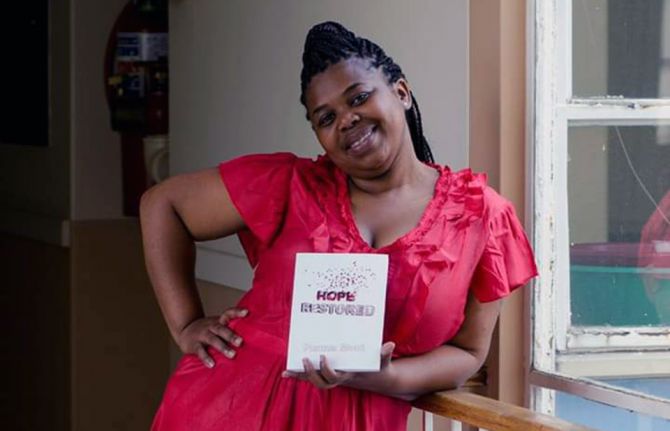
Feature Story
Living with HIV under lockdown
07 April 2020
07 April 2020 07 April 2020Pumza Mooi is worried. A resident of Port Elizabeth, South Africa, she is one of 2.5 million people in the country living with HIV but not currently on antiretroviral therapy.
“I’ve decided that I have to start,” said Ms Mooi. “No matter how strong my CD4 count or how low my viral load, it will never be as good as on HIV treatment. It is something I must do for myself, for my children and for those who look up to me. I am scared of getting sick,” she said.
Ms Mooi’s decision to start HIV treatment comes at a time of uncertainty for people with a compromised immune system, owing to the risk of a severe COVID-19 infection. There is currently no evidence that people living with HIV have any greater risk of acquiring COVID-19, but there is concern that a COVID-19 infection could be more severe for people living with HIV who are not taking antiretroviral therapy.
South Africa is under a 21-day lockdown to try to slow the spread of COVID-19 and Minister of Health Zweli Mkhize has urged everyone to take precautions to prevent infection, emphasizing the importance of everyone knowing their HIV status, getting tested and immediately starting treatment should they test positive.
“The thought of catching COVID-19 frightens me,” said Ms Mooi. “It is scary to think that I already have one virus [HIV] that my body is dealing with. I am asking myself, is my body strong enough, is my immune system strong enough?”
Ms Mooi acquired HIV many years ago, when the prevailing advice was to commence treatment if the patient experienced a reduction in their CD4 count, thus falling ill. She has been monitoring her status ever since. In 2016, the World Health Organization published new guidelines recommending lifelong antiretroviral therapy for all children, adolescents and adults, including all pregnant and breastfeeding women living with HIV, regardless of their CD4 cell count. In other words, anybody diagnosed with HIV should start treatment straight away.
UNAIDS is actively monitoring the impact of COVID-19 and working with networks of people living with HIV, the government and development partners to ensure that the concerns of people living with HIV are heard and reflected in the COVID-19 response. This includes identifying constraints on health services, encouraging longer, multimonth prescriptions of antiretroviral medicine and helping communities to provide solutions.
Social networking
Life under lockdown is especially difficult for people living in informal settlements and UNAIDS has recognized the challenge of achieving self-protection, social distancing and containment in such areas. Added to this are fear-inducing and inaccurate reports about the coronavirus. “There is a lot of information going around but not all of it is true,” Ms Mooi said. “I am reminding people that the government has given us a WhatsApp number where we can get good information, and not to worry about other information. If it is true, the government will tell us.”
Luckily, Ms Mooi has a robust support network after she shared her HIV status online many years ago. “I know I will be looked after,” she says. She moderates Facebook and WhatsApp support groups for people living with HIV that have dozens of members, ranging in age from a 16-year-old born with HIV to a woman of 62 who has lived with HIV for many years.
Over the past few years, many in the group have shared their experiences of living with HIV and their experiences of taking HIV treatment, confronting stigma and discrimination and staying motivated. Their consensus is that taking and adhering to HIV treatment is the best option, Ms Mooi said.
Right now, there is a new topic in the groups. “They are worried about COVID-19,” Ms Mooi said. “I tell them don’t worry, stay home and practice good hygiene.” For the time-being, everyone knows they will have to sit tight and take care of each other remotely, to get through extended isolation.
The group fosters discussion mostly among women, although men are listening in. “I get messages from men asking why we don’t discuss issues affecting them, but if they don’t disclose they won’t always get the help they need,” she says. “I encourage men to share their stories and let us help each other.”
Looking ahead
Like most, Ms Mooi is already looking forward to being able to move about more freely again and to start HIV treatment. She is doing what she can to look after her family and to encourage her networks of people living with HIV. “We are doing the things we are told to do, like washing our hands and keeping away from other people, and just praying and hoping for the best,” she said.











